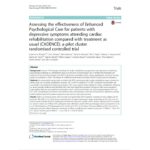Exeter Collaboration for Academic Primary Care (APEx) Blog
Exeter Collaboration for Academic Primary Care (APEx) Blog
Posted by jchoules
17 April 2018“Feasibility and acceptability of an enhanced psychological care intervention within cardiac rehabilitation services for patients with new-onset depressive symptoms compared to treatment as usual”
Depression is common in people with coronary heart disease (CHD), affecting up to 20% of individuals, approximately four times more common than in the general population. Such depression is associated with a doubling of risk of subsequent morbidity and mortality. The detection and appropriate management of depression among people with CHD is a policy priority. Although psychological health is part of cardiac rehabilitation, access to psychological care is patchy.
Our research aimed to address this gap in the provision of psychological support for people with depression, by developing and evaluating Enhanced Psychological Care (EPC), a complex intervention embedded within routine cardiac rehabilitation. Nurses identified patients with depressive symptoms and offered them Behavioural Activation – an established treatment for depression. Nurses were also trained in mental health care coordination.
First, we conducted a multi-method study to determine the feasibility and acceptability of implementing/experiencing EPC from the perspective of cardiac rehabilitation nurses and patients. Preliminary testing of EPC (four teams, nine patients) found EPC to be acceptable, although nurses found it difficult to deliver within their existing workload. The intervention was refined to reduce workload, and then tested in a small pilot version of a potential RCT. A pilot RCT further tested EPC and aimed to clarify uncertainties around participant recruitment and retention needed to design a future, randomised controlled trial (RCT). The following data were collected from patients at baseline, five months and/or eight months: demographic characteristics, medical/cardiac status, psychiatric diagnostic status, depression severity [Beck Depression Inventory (BDI-II)], anxiety (BAI), health-related quality of life (EQ-5D and HeartQoL), degree of BA (Behavioral Activation for Depression scale) and of satisfaction with treatment (Client Satisfaction Questionnaire).
A preliminary economic evaluation was conducted to pilot methods to collect data on costs. Five teams were randomly allocated to deliver EPC and three teams to deliver usual care (UC). Fifty-six of 614 patients screened were eligible for recruitment and 29 patients took part (67% of revised target sample size of 43), 15 of which were in the EPC arm and 14 were in UC. Nurses and patients were also asked to take part in interviews. At five months, the mean BDI-II score was reduced from baseline in both arms. At five months, the mean BAI score improved in both arms, health-related quality of life improved in both arms, and generic health-related quality of life remained largely unchanged in both arms.
At interview, patients and nurses acknowledged the importance of embedding psychological support within routine rehabilitation. However, significant organisational and workload constraints meant EPC was not practical in routine care. The total estimated cost of providing EPC (n=15) of was £13,384 i.e. estimated cost per participant of £959 (93% of total cost due to nurse training). Patients and nurses acknowledged the importance, and recognised the value, of having psychological support embedded within routine cardiac rehabilitation. Consideration should be given to delivering EPC by dedicated mental health workers, such as psychological wellbeing practitioners (PWPs), working closely with cardiac rehabilitation services.
 Richards SH, Dickens C, Anderson R, et al. Assessing the effectiveness of Enhanced Psychological Care for patients with depressive symptoms attending cardiac rehabilitation compared with treatment as usual (CADENCE): a pilot cluster randomised controlled trial. Trials 2018;19(1):211. doi: 10.1186/s13063-018-2576-9 [published Online First: 2018/04/04]
Richards SH, Dickens C, Anderson R, et al. Assessing the effectiveness of Enhanced Psychological Care for patients with depressive symptoms attending cardiac rehabilitation compared with treatment as usual (CADENCE): a pilot cluster randomised controlled trial. Trials 2018;19(1):211. doi: 10.1186/s13063-018-2576-9 [published Online First: 2018/04/04]
Antoinette Davey on behalf of the CADENCE study team